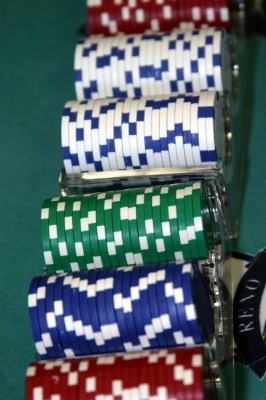|
|

Chip – A small clay or plastic marker indicating a specific value, often wagered in place of cash.
Poker games, like pit games (house
backed casino games like Blackjack, Craps, etc.) use chips for wagering in place of cash. A chip is a round,
color-coded clay or plastic marker with a dollar value typically displayed on one or both sides.. Most chips have a
specific cash value and can be taken to the casino cashier and exchanged for cash. Some chips, such as old, out of
circulation chips, or tournament chips have no cash value and may not be exchanged at the cashier cage.
Periodically, a casino may replace old chips with new ones. When this happens, a casino will usually give players with
old chips a certain amount of time (often several months) to exchange them for new ones. This is done by taking the old
chips to the cashier and making a request for an exchange. The player has until the drop dead date to make the
exchange, or they will be left with chips with no cash value. After the old chips have been removed from circulation,
they are often sold as souvenirs.
Tournament chips also have no cash value. They are only used to determine placement in the tournament. As the
tournament progresses, players are eliminated and the tournament chips are consolidated by the remaining players.
Eventually, there will be only one player left; this player is the winner of the tournament and will therefore receive
the most prize money. Tournament prize money is distributed in a graduated scale starting with the most prize money for
first place. The number of player paid out in a tournament is usually a function of the number of entries; generally
about the top five to ten percent of finishers will receive prize money.
Chips are also called “checks” or “bullets.” There are a variety of nicknames used for chips, including “peanuts”,
“biscuits”, “cookies”, and many others. They can usually be used casino wide for gambling at any game, and may also be
used for purchases made inside the casino. Some casinos do not allow the use of chips for retail and restaurant
purchases. In this case a player will have to cash in their chips at the cage. Occasionally, a casino will use
different chips for poker than are used in the pit. In this case an exchange may be required when moving between pit
and poker games.
A casino may or may not accept neighboring casinos’ chips for exchange. This is done as a courtesy for players who
frequently move from casino to casino and often have chips from multiple casinos. This is only done for casinos in the
same area. For instance, you may be able to exchange Las Vegas chips within Las Vegas, but you would not be able to
bring Las Vegas chips to Atlantic City to exchange.
Chips are usually made out of hard, kiln fired clay, or out of plastic. Casinos will choose a material for their chips
based on several factors, including aesthetics, longevity, and security. Larger denomination chips often contain
security features including embedded holograms, high definition printing, and RFID technology. This prevents
counterfeiting and protects the casino from fraud.
Chips tend to be flat with rounded edges. This makes them easier to stack and cut, and also allows for a uniform fit
into a rack. A rack is a plastic chip holder
which holds one hundred chips. It has five rounded rows, each holding a stack [of 20] chips. The rack is used for
transporting and distributing chips. The racks are stackable, making it easy for one person to handle several hundred
chips. Some casinos use larger, oversized chips for certain games or for high denominations. These chips will not fit
into a regular rack, and an oversized rack must be used. Oversized racks are usually available anywhere oversized chips
are in play.
Chips are also color coded based upon their denomination. The colors used for the different denominations of chips can
vary greatly from casino to casino, especially regionally. For example, in Las Vegas, the $100 chips are mostly black,
and the $1 chips are mostly white. If, on the other hand, you travel to California, the $100 chips are predominantly
white, while the $1 chips tend to be blue. Colors in use are usually white, black, red, blue, green, and sometimes grey
or pink. Regardless of how the casino chooses to color code, the value of the chip will be clearly displayed on both
sides, and color coding will remain consistent throughout the casino.
Chips may or may not be required to play in the game. Some casinos allow cash to play alongside chips, especially in
higher limit games. If cash plays, you will have the option to use either chips or cash. If cash does not play, you
must convert your cash to chips. Casinos are unlikely to take responsibility for counterfeit bills acquired during
play, and not all bills in play have been checked. If you are concerned about receiving counterfeits, you can convert
bills you receive into chips, as you play. A chip attendant or
floorman can help with this.
Usage: Chips Please, Chip and a Chair, Chip Tricks, Chirping Chips
Previous Poker Term: Check Raise
Next Poker Term: Chip Dumping |
|









